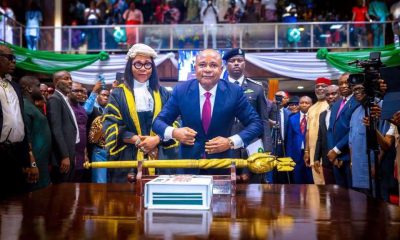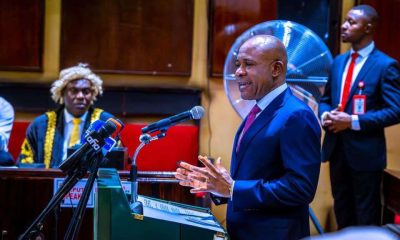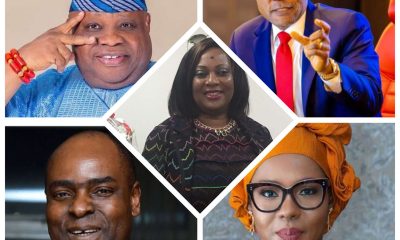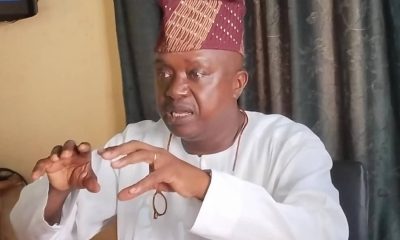Headline
2027: Defection of more govs clears path for Tinubu’s second term
Published
3 months agoon
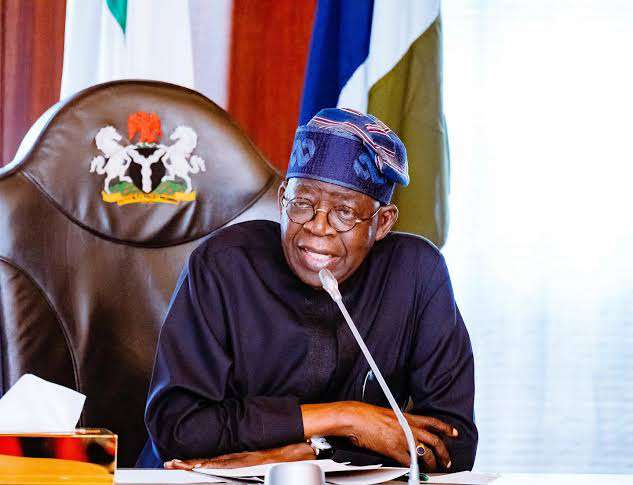
…as opposition crumbles under APC’s “evangelism”
As the political calendar edges closer to the 2027 general elections, President Bola Tinubu appears to be tightening his grip on power. Through a mix of political manoeuvring, party consolidation, and subtle institutional influence, the All Progressives Congress (APC) is gradually clearing the path for his second-term ambition.
Meanwhile, the main opposition forces that once threatened to unseat the ruling party have been weakened by internal divisions, defections, and strategic miscalculations.
The emerging picture is one of a political landscape in flux, with Tinubu and his allies methodically neutralising dissent and consolidating control over the structures of power. From the legislature and judiciary to the security services and electoral institutions, the APC has expanded its reach, while opposition voices within and outside the National Assembly have struggled to mount a coherent challenge.
Opposition in disarray
The Peoples Democratic Party (PDP), which once prided itself as Africa’s largest political party, now finds itself in deep crisis. A string of defections by key figures in the North and South has eroded its organisational strength. Governors, senators, and other political heavyweights, who could once mobilize substantial regional support have either switched allegiance to the APC or retreated into silence.
The defection of Peter Mbah, Enugu State governor to the ruling party means that the South East’s political establishment is firmly in the hands of APC. Yet Mbah’s defection was followed by that of Douye Diri of Bayelsa, who quit the PDP and is expected to join the APC. Kefas Agbu, governor of Taraba, barring last minute change of plans, is also expected to join the APC train.
Atiku Abubakar, the PDP’s 2023 presidential candidate, has kept a low profile since losing to Tinubu, focusing instead on behind-the-scenes coalition talks with Labour Party’s Peter Obi and former Kaduna governor Nasir El-Rufai. The proposed ADC alliance has so far failed to gain traction. Deep ideological differences, personal ambitions, and a lack of trust among its architects have stalled the project.
“The opposition underestimated Tinubu’s ability to hold power,” says political analyst, Chidi Anthony. “He is not just a politician; he’s a political engineer. He understands the power map of Nigeria and knows how to use both patronage and persuasion to achieve his objectives.”
Meanwhile, within the Labour Party, the excitement that followed Peter Obi’s 2023 campaign has largely dissipated. Internal wrangling, legal disputes over leadership, and declining grassroots momentum have left the party struggling to retain its base.
Several of its former backers, especially in the South-East and South-South, now appear disillusioned.
Northern political recalibration
Nowhere is the shift in Nigeria’s political equation more visible than in the North, where Tinubu has worked quietly to neutralize opposition influence. Key northern politicians, who once opposed his rise have since reconciled with the president. Some, like former Sokoto governor Aminu Tambuwal, is said to have aligned with federal structures for political survival, after his brush with EFCC, while others, including former vice president Atiku Abubakar, face waning influence in the region.
The North’s emerging political mood appears pragmatic rather than ideological. “There is fatigue with constant opposition,” says Huseini Mohammed, a political analyst from Borno. “Northern elites are repositioning to protect their interests in the next power cycle, and Tinubu’s government is using that window effectively.”
Tinubu’s appointments have also reflected this balancing act. The inclusion of key northern technocrats and political loyalists in federal positions has helped calm initial suspicion over his leadership. His alliance with figures such as Defence Minister Mohammed Badaru Abubakar and National Security Adviser Nuhu Ribadu has reinforced his standing in the region’s power circuits.
Even in Kano, traditionally a volatile political theater, the president has succeeded in defusing tensions. The resignation of APC national chairman Abdullahi Ganduje earlier this year, and the subsequent rapprochement between Tinubu and his long-time rival, former governor Rabiu Musa Kwankwaso, signaled a strategic peace deal aimed at reclaiming the state’s political loyalty.
Rivers Peace Deal and the Politics of Control
Tinubu’s deft handling of the crisis in Rivers State has further underlined his strategy of consolidating influence in opposition territories. The protracted feud between Gov. Siminalayi Fubara and his predecessor, Nyesom Wike – now Minister of the Federal Capital Territory – had threatened to destabilize one of the country’s most politically strategic states.
After months of confrontation that saw the demolition of the state House of Assembly complex, impeachment attempts, and a near-parallel administration, the presidency intervened decisively. Through a peace deal brokered at Aso Rock, Tinubu managed to calm the tension, ensuring both sides maintained loyalty to the center.
By positioning himself as an arbiter, the president not only restored a measure of order in Rivers but also expanded his leverage over both factions of the PDP in the South-South.
“If you ask me whether I am concerned about our governors leaving for APC, I am more than concerned,” said Bala Muhammed, governor of Bauchi State. “But leadership is a burden. As a leader of a group of equal status, I cannot determine the decisions or inactions of my colleagues, but certainly, a lot of work is being done behind the scenes.”
The Rivers model has since become a template for managing other political flashpoints. Similar interventions have been noted in Edo and Delta, where PDP-controlled structures have been drawn into the APC’s orbit through patronage, appointments, and quiet reconciliation talks.
Institutional consolidation
One of Tinubu’s most decisive achievements since taking office has been his ability to stabilize and co-opt key state institutions. The judiciary, already criticized for controversial judgments in the 2023 election petitions, has continued to hand down rulings perceived as favorable to the ruling party.
The president’s appointment of perceived loyalists to strategic agencies – including the Independent National Electoral Commission (INEC), the Central Bank of Nigeria (CBN), and the Economic and Financial Crimes Commission (EFCC) – has further strengthened his hold on the machinery of governance.
“The institutional recalibration we’re witnessing is part of the president’s long-term political strategy,” explains Anthony. “Tinubu is ensuring that by 2027, every critical institution of state is both stable and loyal.”
These developments have drawn criticism from civil society groups, which warn of a gradual erosion of checks and balances. However, within political circles, the consensus is that Tinubu is merely applying lessons from his predecessors, consolidating early to avoid surprises later.
Economic headwinds and public discontent
Despite his growing political dominance, Tinubu faces mounting economic challenges that could test his electoral strength. The removal of fuel subsidy, floating of the naira, and inflationary pressures have triggered widespread hardship. Food and transport costs have soared, unemployment remains high, and public anger over living conditions continues to simmer.
Labour unions have repeatedly threatened strikes, while professional bodies and student groups complain of worsening welfare. The administration’s plea for patience, anchored on promises of long-term reform, has yet to yield visible relief.
Nevertheless, the government’s political calculus seems to be that economic pain will not necessarily translate into electoral defeat. The fragmentation of the opposition, combined with the use of state resources for political patronage, may blunt public frustration.
“Economic hardship alone doesn’t unseat incumbents in Nigeria,” observes Anthony. “It’s the combination of hardship and a united opposition that make change possible – and right now, that opposition doesn’t exist.”
Rebuilding the ruling party
Internally, Tinubu has moved to strengthen the APC after years of factional disputes. Following Ganduje’s resignation as national chairman, the party’s National Working Committee was restructured to reflect a more loyal and balanced composition. Regional blocs within the party have been pacified through appointments and budgetary incentives.
The president’s allies now control the major organs of the APC, from the Governors’ Forum to the National Assembly leadership. Senate President Godswill Akpabio and House Speaker Tajudeen Abbas, both staunch Tinubu loyalists, have maintained smooth legislative cooperation with the executive, a marked contrast to the tensions that characterised the early Buhari years.
In the South-West, the president’s home base, internal cohesion has largely been restored after early signs of rift among old political associates. Key figures like former Osun governor Gboyega Oyetola and Ekiti’s Biodun Oyebanji have been repositioned for strategic roles.
The Supreme Court factor
Tinubu’s relationship with the judiciary has remained central to his consolidation. The Supreme Court’s handling of politically sensitive cases – from election petitions to constitutional disputes – has reinforced perceptions of executive influence. The court’s delayed hearing of key constitutional suits, such as the challenge to the emergency rule in Rivers State, has fuelled concerns about judicial independence.
While the presidency insists on respecting judicial processes, critics argue that slow case management has effectively favored the executive. “What we are seeing is the quiet politicization of the judiciary,” says Lagos-based constitutional lawyer, who opted not to be named. “It’s not about overt interference but about systemic alignment with the ruling elite.”
For the Tinubu administration, however, judicial stability is viewed as essential for policy continuity. The avoidance of legal shocks, particularly in election matters, ensures that government programs and political timelines remain predictable ahead of 2027.
Regional balancing and the Shettima question
One unresolved issue within the APC remains the question of regional balancing ahead of 2027, specifically, whether Vice President Kashim Shettima will retain his place on the ticket. Speculation has grown that Tinubu might consider a running mate from another region to broaden his electoral appeal, particularly if northern sentiment tilts toward rotational justice.
However, insiders say the president values Shettima’s loyalty and network within the North-East and may retain him. “Tinubu is not looking for popularity; he’s looking for stability,” says a senior APC source. “The vice president has delivered on that.”
Still, analysts note that the president’s recent outreach to Middle Belt and North-West leaders suggests a deliberate attempt to strengthen northern confidence ahead of his second-term declaration.
Democratic concerns and the road ahead
Civil society groups and opposition figures have continued to warn that Tinubu’s political consolidation could threaten Nigeria’s fragile democracy. The concentration of power in the presidency, coupled with the weakening of opposition parties, mirrors trends seen in other African states where dominant-party systems have emerged.
The arrest of dissenting voices, the reactivation of restrictive laws, such as the Cybercrime Act, and the securitization of protests have all raised alarm. Yet, the administration maintains that these measures are aimed at protecting national stability.
“Tinubu’s political genius lies in his ability to institutionalize dominance while projecting normalcy,” notes political historian, Sam Amadi. “He’s not dismantling democracy; he’s redefining it in his own image.”
For now, the president’s biggest asset remains time, and the absence of a credible challenger. With the PDP fragmented, Labour disorganized, and regional parties lacking national spread, Tinubu’s path to 2027 appears remarkably clear.
However, much will depend on whether the economic situation improves and public confidence in his leadership can be restored. History suggests that Nigerian politics is rarely static; sudden coalitions and social movements have often changed trajectories.
Still, as things stand, the 2027 race increasingly looks less like a contest and more like a coronation, a culmination of decades of political calculation by a man who has spent much of his life mastering the art of power.

Continue Reading
Advertisement
You may like


Oil price dispute stalls 2026–2028 budget framework as Reps step down MTEF/FSP


Enugu governor revamps cabinet, approves key appointments across state agencies


Gov Mbah presents ₦1.62tn ‘Budget of Renewed Momentum’, unveils massive plans for 2026


FOR THE RECORD: Speech delivered by Peter Mbah at the presentation of Enugu’s 2026 budget


Govs Adeleke, Mbah, Abdulrazaq, others win Zik Prize


Osun gov poll: My administration will focus more on industrialization of the state if elected – Omoworare
Click to comment



